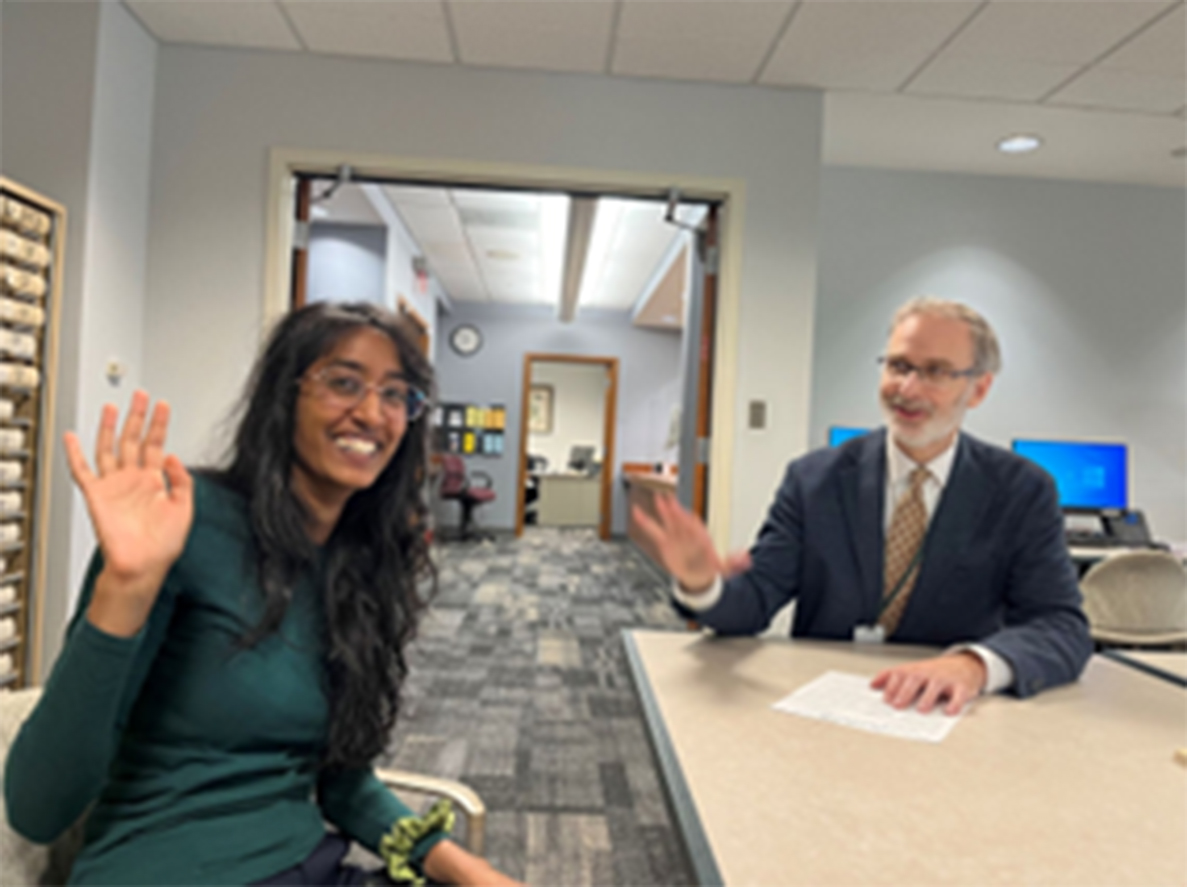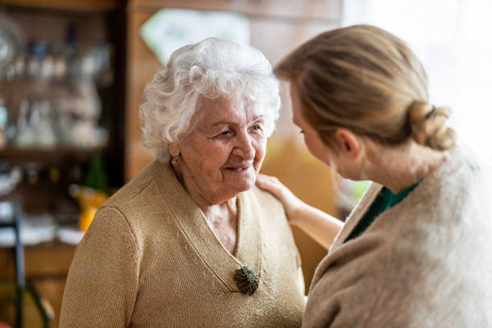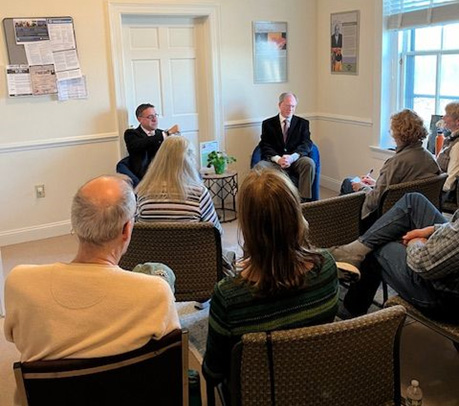
Volunteers who make decisions for incapacitated adults
VG recruits, trains, and matches volunteers to become legal guardians for incapacitated adults. Legal guardianship in New Jersey is made up of the Guardian of the Person and the Guardian of the Property. When one person fulfills both of these roles, it is a full, or plenary, guardianship.
A Guardian of the Person:
is responsible for making medical, housing, end-of-life and other decisions directly related to the person:
- Ensure a safe, suitable living arrangement in the least restrictive environment possible.
- Arrange for needed support services and monitor the quality of the services.
- Arrange for needed support services and monitor the quality of the services.
- Provide opportunity for activities and enrichment.
- Visit IP at least once a month.
At the time of death, If designated as the funeral agent, the guardian ensures the person in their care is laid to rest in a compassionate and dignified manner that is compatible with their wishes
A Guardian of the Property:
is responsible for anything related to the assets, income, or other financial aspects of the guardianship.
- Open a separate guardianship bank account.
- Retitle assets and accounts in the name of the guardianship.
- Maintain records of guardianship account transactions.
- Investigate and inventory the incapacitated person’s assets and liabilities.
- File an initial inventory with the court and send copies to interested parties.
- Keep original papers (insurance policies, deeds) in a safe and secure location.
- File periodic reports as to the estate of the IP
- Discuss decisions with the IP and consider their input and preferences.
- Pay all bills and generally manage financial affairs.
Who We Serve
Only adults that have been (or are may soon be) determined by a court in NJ to be legally incapacitated and that have no family or friends able to qualify to serve as a guardian are eligible to receive guardianship services through VG. Some reasons for incapacitation include Alzheimer’s and other forms of dementia, stroke, traumatic brain injury, psychiatric illness, and intellectual or developmental disability.
There is a legal process to determine that someone is incapacitated in New Jersey. Learn more here: https://www.njcourts.gov/courts/civil/guardianship
VG often works in tangent with the referral source; while their legal department goes through the process of determining incapacitation VG can screen the referral and, if appropriate, seek out a volunteer who can be proposed at the same hearing incapacitation is established.

We currently accept referrals from Hunterdon, Somerset, Warren, Morris, Union, Mercer, Middlesex and Monmouth Counties. Services are contingent on identifying a compatible volunteer.
Volunteer Guardianship for Victims of Abuse (VGVA)

VG has a special program designed to meet the special needs of incapacitated people that have been victimized.
VGVA provides 1:1 volunteer guardianship to adult incapacitated people that have been victims of elder abuse, domestic violence and/or theft. Incapacitated people are at greater risk of abuse due to their cognitive impairment, dependency on others, and fear of repercussion. Most are discovered only when they come to the attention of others (i.e. ombudsman, hospital, police, or adult protective services.) At times, the victimization is not recognized/fully understood until a guardian is in place.
Each victim is paired with a volunteer community guardian that ensures the safety of the victimized IP as well as fulfills their duties such as ensuring housing in the least restrictive environment and managing care, responsible financial management of income/assets, making medical decisions and other ethical decision making that maximizes autonomy. Volunteers paired with someone who has been victimized receive special training to understand how trauma might manifest itself in incapacitated people and how to safeguard against re-victimization/re-traumatization.
How To Make A Referral
Most of our referrals come via Adult Protective Services, hospitals, nursing homes, or other third parties involved with the person in need.
Steps to Make a Referral
- Reach out to VG at info@volunteerguardianship.org or (908) 486-5314. We will answer any questions and email you a Referral for Guardianship form, which asks for details about the current legal status of the individual, current status related to housing, health, finances, insurance and information about level of care needed.
- Return the referral form.
- All referred individuals are reviewed by an internal committee to determine if we can effectively meet the needs of the referred individual person. We will follow up with any additional questions. The volunteer may also choose to meet the individual in advance, before accepting the guardianship assignment.
VG has an attorney that represents our volunteers at the time of the hearing to establish guardianship. The recommendation is made to the judge that our volunteer be assigned the guardian, under the auspices of our organization. Once approved by the judge, the guardianship is established, and our volunteers move forward with their fiduciary responsibilities.
Community Education

VG sponsors monthly educational sessions for volunteer guardians, as well as the community at large, on a variety of topics related to or adjacent to guardianship. Sessions are delivered by a variety of qualified professionals that volunteer their time to educate the community.
Coming Soon: Link to upcoming training
Frequently Asked Questions
What problem do you address?
In New Jersey alone, the court has deemed 23,345 individuals to be incapacitated and in need of an assigned guardian; almost 10,000 of them are aged 60 and over. New Jersey expects to see the population of people over the age of 60 grow more than 30% between 2019-2029, with a corresponding increase in guardianship cases. Most of these people have family or friends who can take on the responsibility of making substitute decisions in areas such as medical care, housing, property and finances, and other areas related to general health and wellbeing. But some do not.
When an incapacitated person has no family or friends who can serve as their guardian, which occurs in a small but growing number of situations in New Jersey, public guardianship occurs.
If someone is age 60 or over, they can be referred to the NJ Office of the Public Guardian (OPG) who will assign staff to fulfill the role of guardian. If someone has an Intellectual or Developmental Disability (IDD), they can be referred to the NJ Bureau of Guardianship Services (BGS).VG offers a community based, one-on-one alternative to these government models in which the incapacitated person receives more frequent visits and personalized attention by a volunteer that loves in close proximity to the person they serve as guardian for. If an incapacitated adult is younger than 60 and does not have an IDD, there is no public option of guardianship available to them. This could occur due to medical events such as early onset dementia, a Traumatic Brain Injury, a stroke, or a severe psychiatric illness.
What does it mean to be incapacitated?
Incapacitation occurs when someone is unable to care for themselves and/or their property. They suffer from a loss or lack of cognitive or mental ability.
What is a guardian/guardianship?
A guardian is someone whom a judge deems legally responsible for making substitute decisions regarding another person’s finances, health care, and/or daily life when they no longer have the capacity to do so for themselves.
Who are your volunteers?
Our volunteers come from all walks of life and are the reason we can continue to offer our services. Some have gone through a similar situation with a loved one and want to use those skills on behalf of someone else; others are motivated by the thought of who will be there for them- they want to pay it forward. They all share a desire to help someone in need and offer their time to provide support to those who need it most.
How are people referred to you?
Referrals most often come from Adult Protective Services (APS), nursing homes, the County Surrogate’s office, hospitals, and attorneys.
How does VG support the volunteer guardian?
Our staff is always available to guardians who have been matched with an incapacitated person. We provide practical guidance, emotional support, and resources when needed; ensure mandatory reporting has been done correctly before it’s submitted to the Surrogate; provide ongoing training opportunities; and check-in regularly. Staff also facilitates access to the experts on our board and advisory committee who are always available to assist and support.
Do your volunteer guardians have legal protection?
VG carries insurance that covers our volunteers if they are injured while serving or if they are accused of wrongdoing and need a legal defense. Fortunately, we have never had a single case in which we have needed to utilize our insurance coverage.
Do your volunteer guardians have legal protection?
We cannot establish incapacitation-only the court can do that- and the only way they can investigate is if someone makes a complaint to the court and the affidavits/certifications of two qualified physicians are procured. If the individual has already been declared incompetent or this seems imminent, and you would like to refer them to our services, please call us at 908-483-5896 or email info@volunteerguardianship.org.
. We have a process in place that allows us to determine if we can accept the referral based on the needs of the individual and our current inventory of screened and trained volunteers.
I would like to join you as a volunteer! What should I do next?
If you are interested in volunteering with us, please visit this page, where you’ll find the volunteer application. For more information, please call us at 908-483-5896 or email info@volunteerguardianship.org.